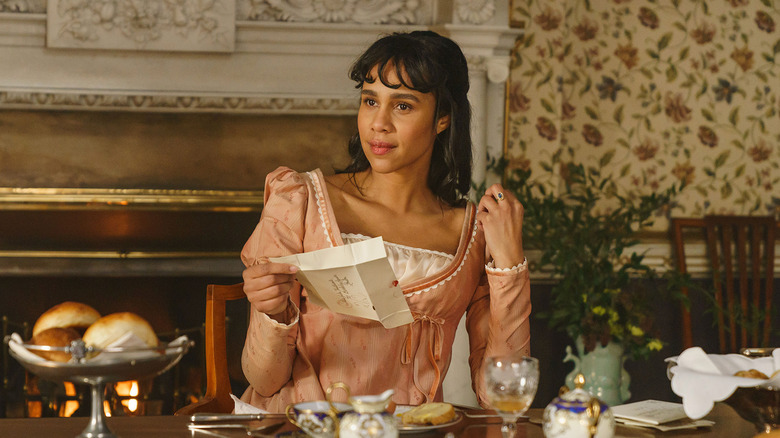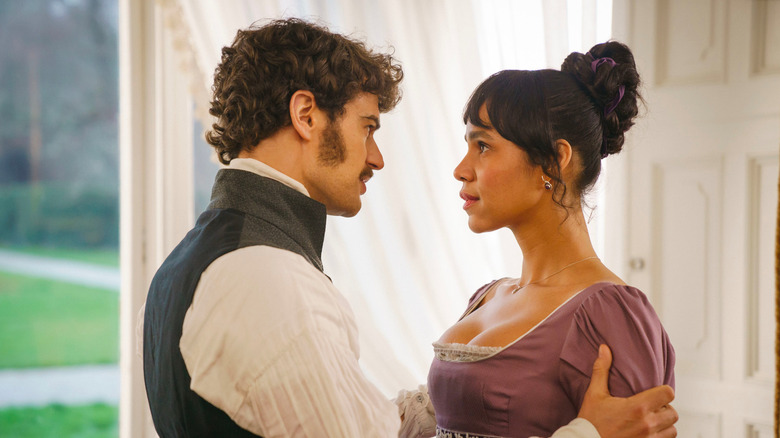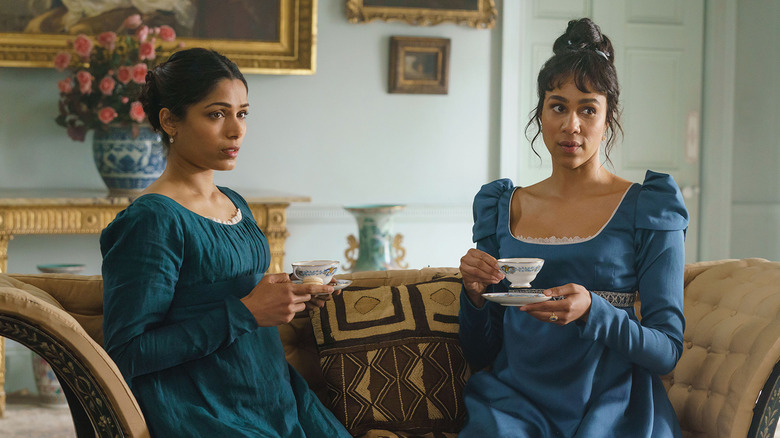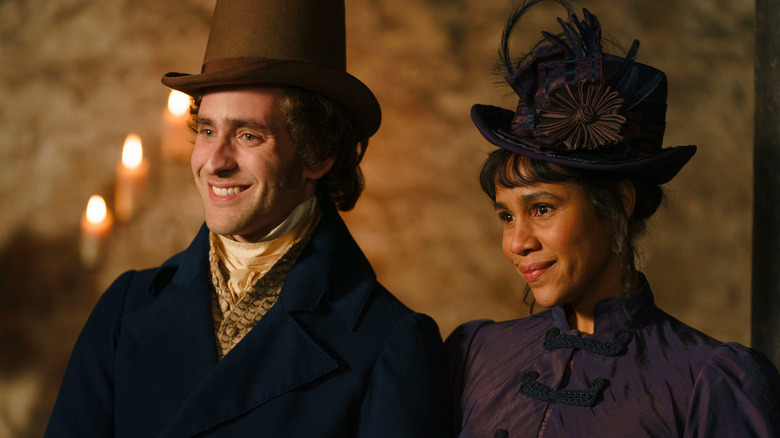Mr. Malcolm's List Actor Zawe Ashton Taps Into The Feminine Mystique [Interview]
After watching her turn as the cunning Julia Thistlewaite in "Mr. Malcolm's List," one might expect Zawe Ashton to be similarly intimidating. She's the kind of scene-stealing performer whose reputation definitely precedes her: Ashton's career spans decades, following the actor-writer-filmmaker from the stage to the screen and back again. It's easy to feel intimidated by the thought of speaking to Ashton (I definitely was), but all that melted away when I sat down to chat with the "Mr. Malcolm's List" star.
Speaking with Ashton is like making fast friends with a stranger in the place you least expected to. Her thoughts on Regency life and antiheroism are candid, hilarious, and considerably devoid of ego. Ironically enough, it is ego (and a thirst for revenge) that catalyzes the plot of "Mr. Malcolm's List." After Ms. Thistlewaite is humiliated by the titular Mr. Malcolm (Ṣọpẹ́ Dìrísù) — and immortalized in a Regency-era meme — she sets off to knock the bachelor down a peg. She asks her childhood friend, Selina Dalton (Freida Pinto), to pose as Malcolm's perfect woman, only to leave him high and dry once he starts to fall for her. It's the kind of story you'd expect from a '90s-era rom-com, where the stories usually begin with a harmless bet and feature at least one makeover montage. In that kind of story, Julia would be the villain, a cut-and-dry mean girl who gets what she "deserves" before the credits roll. But for director Emma Holly Jones and writer Suzanne Allain, "Mr. Malcolm's List" was not that kind of story.
Not only is Julia a character worthy of redemption (despite her questionable choices), but she's also worthy of a happily ever after. Her subversive arc appealed tremendously to Ashton, who'd never had the chance to star in a period romance before "Malcolm's List." The process was undeniably euphoric for the actor, especially when it came to the film's gorgeous costumes, but not without a few corset-related challenges. "Getting used to seeing your own bosom whilst acting is definitely a journey," Ashton mused. "But also what I love is, again: The sensuality, the feminine mystique that I'm not drawn to necessarily in my own life. I don't think about enhancing my bosom, necessarily. And I definitely will now from now on — for myself, not for anyone else."
I chatted with Ashton about walking the line between hero and villain, and tapping into the iconography of the Regency period.
Warning: Light spoilers ahead.
'She feels like the Regency Bridget Jones'
You've spoken before about your attraction to more extreme characters. Is that what attracted you to Julia?
Well, do you know, I loved ... when I read [the script], I had 24 hours to read and decide and meet with Emma, our director, because two fantastic actresses had not been able to do the role. And Lyvie, I have no ego about that kind of thing because filmmaking is an intricate process that has lots of just twists and turns. But as an actor, the way that you come onto a project is often so influential. So having that very, very short decision time kind of made the decision easier in a way, because you go straight to the heart of things, I think. So I instantly read the intersection of genres present in this film. I'm a rom-com fan, I'm a fan of the new Regency-core journey that we're on as an industry, so that was an intersection that was a tick.
I also was like, "There's something so contemporary about this woman, Julia." We meet her at a point in her life where she's four seasons without a match. Her mother's starting to give her the side eye at every opportunity, reading out the latest matrimonial news at every opportunity. And that's something I think women can really understand, when society starts to kind of close in on you with that messaging of where you're supposed to be at in your life versus where you might be.
And I think I said to Emma in one of our initial interviews — or our only interview — I was like, "She feels like the Regency Bridget Jones." And that's a wonderful place to start. And then she becomes this protagonist. And then she becomes this humbled figure who lets her guard down and finds love and gets that intention that she sets off in the beginning of her life with, which is to marry for love. And I just really embraced the arc of that. I embraced the lightness and the kindness of the movie. We were in the second wave of lockdown and I knew that it was going to be a really wonderful spiritual reset to do something this fun.
And I have a very, very strong intentionality when it comes to supporting first-time filmmakers from underrepresented intersections. So it was just like "tick, tick, tick, tick, tick" in the space of 24 hours. And then I found out who the cast was and then I said, "Definitely. Please yes, I'll do this."
'I really don't want to ever defang a performance for the purposes of being palatable'
I love that you touched on kindness, because I feel like Julia sort of walks the scorned woman archetype throughout the film and she does make questionable choices, but she's never demonized. At the very end, she's able to find that she is worthy of love and forgiveness — which from a modern perspective, especially for women of color, that was so, so refreshing to see.
I think it's deeply refreshing to see. And you asked about a penchant for extreme characters. I wasn't drawn to Julia's extremes necessarily, but I'm always drawn to walking that line, I think. People in life are complex and I think I have a superpower as an actor for just really not minding if I'm disliked. I think lots of actors really desperately would like to be liked, but I don't know. I'm open to anti-hero-ness. I think they were the characters that I always warmed to as a child, when I was watching animated films or when you were at a puppet show, or just those first formative steps into understanding different creative worlds. I was an Ursula "Little Mermaid" fan. [Laughs]
They have much more fun, to be honest.
I think it's sort of ... you have to do more work as an audience member, and as an actor if you are going to win them over in the end. And of course you can win people over by just being extremely devious, and that's a very delicious experience.
I really love that also we're seeing an antagonist in a film of this genre who is a woman of color, who isn't attempting to be anything other than who she is. I really don't want to ever defang a performance for the purposes of being palatable. I personally don't feel like I make good work if I'm trying to pander to an audience in that way. And I also feel like you don't keep the door open for even more complex interpretations in that space, unless you really commit to walking that line. So I have a penchant for walking the line.
'Putting on a bonnet was heaven'
You've spoken about your relationship to secondhand clothes and how vintage has helped you find characters in the past. How did costuming inform your kind of molding of Julia?
Huge. And I'm so glad they have the costumes on show here at Saks Fifth Avenue as a way of representing this film. I love it mostly because there wasn't a huge amount of budget to make a lot of costumes. We really had to kind of do a lot with a little and that's down to our fantastic costume designer, Pam Downe.
Costume is very influential in this film, because I'd never played this era before, the Regency era. It's something that you've watched for such a long time. It has so much iconography attached to it. Stepping into it is a very, very unique experience, because the door has been closed to this genre to me for a very long time. So putting on a bonnet was heaven. I was like, "I feel cute! And I feel aspirational." Putting on the little ballet slippers that they wore at that time, it's extremely ... again, it's just very, very gentle and very ... it has a softness to it that really does transport you from this world to that one.
Also, I feel like there was something really, really fantastic about how sometimes wrong Julia was getting the fashion of that time. Her huge feather that was extremely offensive to Malcolm, I mean ... there was just a wonderful freedom in that to be someone who was presenting this very fashionable high society woman, but without making those fumbles and mistakes that we all make. Because of course, it was a hedonistic time. We don't think of it necessarily as that because we see the slightly more repressed behavior. Then the Victorians came along and corseted the Georgians up for a reason, because it was kind of sexy and out there! It was, again, it had this contemporary edge of a woman who's kind of embracing the fashions of the time and not necessarily always hitting the mark, but having fun with it. There was a huge freedom in that.
"Mr. Malcolm's List" hits theaters on July 1, 2022.



